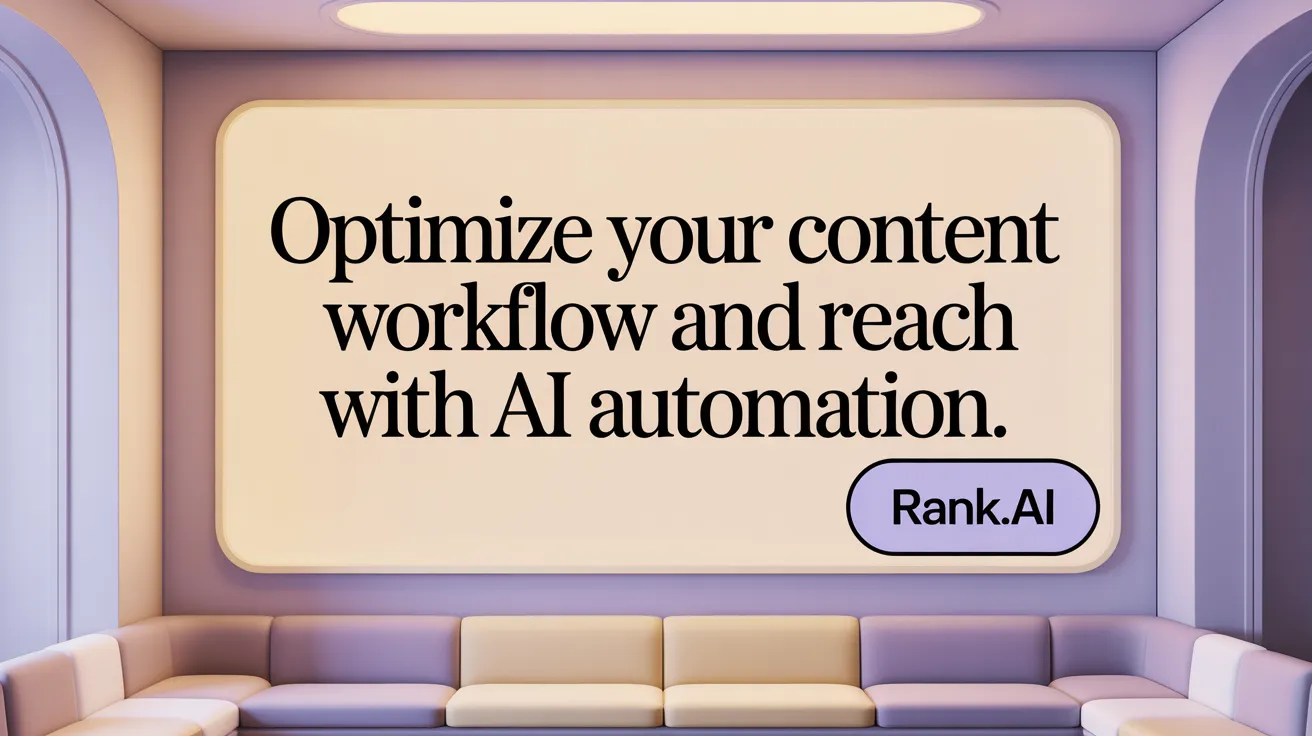Boost Content Marketing Efforts With AI-Driven Optimization Tools
Harnessing AI to Revolutionize Your Content Marketing Strategy

The AI Advantage in Modern Content Marketing
In the evolving digital landscape, AI-driven optimization tools have become indispensable for content marketers aiming to elevate online visibility, personalization, and efficiency. Leveraging AI's capabilities enables marketers to automate repetitive tasks, generate high-quality SEO-friendly content, and refine strategies with real-time analytics. This article explores how AI technologies transform content marketing by offering tools that enhance creation, optimization, distribution, and performance analysis, ultimately driving greater engagement and ROI.
Understanding AI-Driven Content Marketing Optimization

What is AI content marketing optimization and why is it beneficial?
AI content marketing optimization uses artificial intelligence tools to enhance digital content, aiming for higher search engine rankings and improved audience engagement. It automates tasks like keyword analysis, readability improvements, and content structuring, allowing marketers to produce content more efficiently and at greater scale. Learn more about AI content optimization.
Key benefits of AI in content marketing optimization
- Efficiency and scalability: AI automates repetitive tasks, streamlining content creation workflows and reducing production time. Discover tools for content marketing automation.
- Improved SEO performance: By assessing keyword relevance, user intent, and competitor data, AI SEO tools help optimize content to rank better in search engines. Explore AI content marketing strategies.
- Enhanced readability and engagement: AI suggests improvements to structure, tone, and clarity, making content more accessible and appealing. See examples of AI readability editing and tools like Hemingway App.
How AI personalizes content and analyzes user intent
AI leverages user data and search behavior to tailor content messaging that matches audience expectations. It understands the intent behind keywords and search queries, enabling marketers to create targeted, user-focused content that resonates and converts more effectively. This personalization supports smarter content strategies and better marketing outcomes. For deeper insights, visit AI in content marketing and AI-driven content strategy.
Core AI Technologies Transforming Content Marketing

Which AI technologies are central to content marketing transformation?
Core AI technologies driving change in content marketing include natural language processing (NLP), machine learning, and deep learning.
NLP enables tools to understand, interpret, and generate human language, making it possible to automate content creation that feels natural and tailored. Machine learning analyzes large datasets to make predictions and improve marketing strategies over time.
Deep learning underpins generative AI models such as ChatGPT and Jasper AI, which can produce high-quality textual content including blog posts, social media captions, and marketing copy.
Predictive analytics allows marketers to forecast trends and customer behaviors, optimizing content strategies for better engagement and conversion. Sentiment analysis gauges audience emotions and reactions across platforms, helping tailor messages to resonate effectively.
Together, these AI capabilities support marketers in executing data-driven, scalable, and personalized content marketing efforts that meet modern demands efficiently and creatively.
Automating Content Creation With AI Tools

Popular AI content creation tools
AI-driven platforms such as Jasper AI, ChatGPT, and Brandwell have revolutionized the way marketers produce content. Jasper AI excels in crafting diverse marketing materials including blog posts, emails, product descriptions, and landing pages with various tones and styles. ChatGPT supports content generation and brainstorming, while Brandwell integrates Semrush keyword data to produce SEO-optimized blog posts that rank well on search engines.
Generating SEO-optimized content
These tools rely on large language models combined with extensive SEO metrics like keyword density and readability scores to create tailored content. Brandwell and Jasper AI use such data inputs to generate copy that not only engages readers but also boosts search engine visibility. This automation accelerates content production, allowing marketers to scale output efficiently while targeting specific keywords and topics.
Maintaining brand voice and human oversight
While AI tools automate many content creation tasks, preserving brand voice remains crucial. Success depends on training AI models with style guides, content briefs, and examples to align with brand identity. Additionally, human editors review AI-generated drafts to add creativity, ensure authenticity, and prevent tone inconsistencies. This balance between AI efficiency and human input safeguards quality and supports meaningful audience connections.
How do AI tools automate content creation while preserving brand voice?
AI content creation tools like Jasper AI and Brandwell generate SEO-optimized copy for blogs, emails, and product descriptions by leveraging large language models and keyword data platforms such as Semrush. Maintaining brand consistency requires training AI on style guides and human review to ensure authenticity, creativity, and alignment with brand messaging.
Enhancing SEO Through AI-Powered Content Optimization

In what ways does AI improve SEO content optimization?
AI revolutionizes SEO content optimization by providing precise data-driven insights and actionable recommendations. Tools such as Surfer SEO content optimization evaluate crucial SEO factors including keyword density, readability, and content structure to ensure pages perform well in search results. They assist marketers in balancing keyword usage to avoid overstuffing while maximizing relevance to search queries.
Beyond keyword analysis, AI SEO tools offer metadata optimization by suggesting compelling titles and descriptions that improve click-through rates. They also recommend internal linking opportunities, enhancing site navigation and spreading link equity across important pages.
AI-driven SEO platforms conduct thorough content gap analysis by scrutinizing competitors' strategies and identifying topics or keywords that are underserved. This enables marketers to create authoritative content that fills those voids, boosting search engine visibility.
By blending real-time user intent analysis and evolving search trends, AI SEO tools help marketers produce more targeted content that resonates with audiences and ranks higher in search engines. This comprehensive approach improves content discoverability, engagement, and long-term SEO success. For further insights, see AI content optimization with Surfer SEO.
Automating Content Marketing Workflows and Distribution

How does AI facilitate workflow automation and content distribution?
AI dramatically streamlines content marketing workflows by automating repetitive and time-consuming tasks. Workflow automation platforms like Zapier and Gumloop stand out by connecting various marketing applications without the need for coding. Zapier integrates with over 8,000 apps, allowing marketers to set triggers that automatically schedule posts, format content, and manage multi-channel publishing. Gumloop offers similar capabilities while integrating with premium AI models such as GPT-4, enhancing automation with AI-powered intelligence. These are some of the leading AI marketing tools used to optimize content workflows.
Automated scheduling and multi-channel publishing
These platforms automate content dissemination across social media, email, blogs, and other channels. By removing manual scheduling, marketers save time and ensure consistent posting. Automation tools also handle post formatting and alignment with channel-specific requirements, maintaining brand consistency while maximizing operational efficiency. This use of content marketing automation leverages AI-powered content distribution to scale marketing efforts efficiently.
Personalization and audience segmentation
Beyond simple automation, AI enhances content distribution by segmenting audiences based on behavior, preferences, and demographics. This segmentation allows for hyper-personalized campaigns where the right content reaches the right audience at the best time. Personalized content increases engagement rates and conversion by tailoring messaging and offers to individual customer profiles. Advanced AI-driven content analytics and audience segmentation help marketers deliver tailored experiences that drive higher ROI.
By combining AI-driven workflow automation, intelligent scheduling, and audience segmentation, marketers can dramatically improve reach and engagement while significantly reducing manual workload. This integration of AI tools for marketing automation represents the future of efficient, scalable digital marketing.
Leveraging AI Analytics for Real-Time Content Performance Insights
How do AI analytics tools enhance content marketing effectiveness?
AI-powered analytics tools transform content marketing by offering real-time dashboards that visualize critical performance data. These platforms process vast datasets across social media, websites, and other channels to track engagement metrics like clicks, shares, and time spent.
Beyond raw numbers, AI systems analyze audience sentiment by evaluating comments, reviews, and social listening data. This helps marketers understand how their content resonates emotionally, enabling trend detection and audience mood assessment.
With continuous updates, marketers receive timely alerts on shifting consumer interests or emerging topics. This data-driven approach allows rapid strategy refinements, prioritization of high-impact content, and smarter budget allocation.
By harnessing AI analytics, teams can optimize campaigns dynamically, increasing return on investment while maintaining responsiveness to evolving audience preferences. The ability to integrate disparate data sources and generate actionable insights makes AI analytics indispensable for modern content marketing.
Scaling Content Output with AI While Maintaining Quality
How can marketers scale content production with AI without compromising quality?
AI technology significantly accelerates content production by generating draft texts, outlines, and summarizing research, reducing content creation time by as much as 70%. This rapid generation allows marketing teams to produce more assets efficiently, meeting growing content demands.
However, rapid output alone is not sufficient. Maintaining high-quality, relevant, and authentic content requires balancing automation with human creativity. Human editors refine AI-generated drafts to preserve brand voice, inject creativity, and ensure content resonates with the target audience.
To address concerns about AI content authenticity and plagiarism, tools like Originality AI content detection are essential. These tools detect AI-generated content and potential plagiarism, enabling marketers to verify originality and maintain trustworthiness in their content.
Through this combined approach—leveraging AI content marketing for speed and human expertise for quality—marketers can scale content output effectively without sacrificing standards or brand integrity.
AI Tools for Multimedia Content Creation and Enhancement
What AI tools assist in multimedia content creation for marketing?
AI-powered tools have revolutionized multimedia content creation by enabling marketers to produce high-quality visual and audio assets efficiently.
AI Image Generators like Lexica Art and PhotoRoom AI
Lexica Art is a notable AI image generator used for creating customized, on-brand images for blog thumbnails and social media posts, allowing brands to move away from generic stock images. Complementing this, PhotoRoom AI specializes in removing backgrounds from images quickly, helping marketers craft polished graphics for various platforms without the need for complex manual editing.
AI-Assisted Audio Editing with LALAL.AI
For audio content, LALAL.AI leverages AI to remove background noise from recordings. This tool is especially useful for podcasters and video content creators who seek clear and professional-sounding audio without extensive sound engineering skills.
Short-Form Video Creation via Crayo
Crayo focuses on generating short-form videos optimized for social media platforms like TikTok and Instagram Reels. This tool assists marketers in quickly producing viral-ready video content that aligns with platform trends and audience engagement patterns.
These AI marketing tools streamline the multimedia content creation process, enabling marketers to maintain brand consistency and enhance the quality of their marketing assets with minimal manual effort.
Ensuring Brand Voice Consistency and Message Authenticity with AI
How do AI tools help maintain consistent brand voice and authenticity?
AI-powered tools play an essential role in preserving a brand’s unique voice and authentic messaging across all content formats.
Collaborative platforms like Writer.com empower marketing teams to co-create content seamlessly. These platforms offer AI-driven suggestions to ensure that every piece aligns with the brand’s style guidelines, facilitating uniformity across various authors and content types.
Grammarly Business enhances this process by providing sophisticated grammar and tone checks tailored to a brand’s voice. It analyzes writing style and offers real-time recommendations to maintain professionalism and consistency, helping teams stay true to their messaging standards.
Additionally, rewriting tools such as Undetectable AI improve content authenticity by transforming AI-generated text to sound more natural and human-like. This helps prevent detection as machine-generated content, thereby preserving credibility while reinforcing consistent brand messaging.
By integrating these tools, companies can instill confidence that every communication reflects their core identity and resonates genuinely with their audience.
Integrating AI-Driven SEO Platforms to Boost Visibility
How can AI-driven SEO platforms improve a brand’s online visibility?
AI-driven SEO platforms like Rank.ai SEO Platform and MarketMuse AI content planning offer advanced capabilities for enhancing online presence. These platforms analyze extensive content inventories to pinpoint valuable topics and uncover gaps in existing content. By combining AI-powered insights with tried-and-true SEO strategies, they enable marketers to craft content that aligns with both search engine algorithms and user search intent.
Platforms like Rank.ai and MarketMuse
Rank.ai integrates AI technology with traditional SEO techniques to optimize content visibility across different search engines. MarketMuse focuses on detailed content planning by identifying topic clusters, content gaps, and difficulty scores, helping prioritize efforts for maximum impact. Both platforms provide actionable recommendations to improve content structure, relevance, and overall quality.
Combining AI with traditional SEO strategies
Integrating AI SEO tools does not replace conventional SEO but rather enhances it. Using AI to analyze competitor content, keyword opportunities, and user behavior data helps marketers refine their strategies. This hybrid approach ensures content optimization remains aligned with evolving SEO standards and search engine updates. Learn more about AI SEO Tools Review and AI content optimization.
Monitoring AI-driven search engine presence
Modern search environments increasingly rely on AI-driven features such as voice assistants and chatbots. AI SEO platforms track how brands appear within these new search contexts, enabling adjustments to capture AI-generated traffic. Monitoring includes assessing branded mentions, keyword performance, and how AI interprets brand content to maintain competitive advantage. For insights on AI-driven content analytics and monitoring and AI marketing tools.
Together, these approaches empower businesses to boost organic visibility, engage targeted audiences more effectively, and adapt swiftly to the changing digital search landscape.
Content Repurposing and Multichannel Distribution Using AI
In what ways does AI enable effective content repurposing and distribution?
AI plays a crucial role in repurposing existing content by analyzing what resonates best with audiences and adapting it into new formats. This approach allows marketers to extend the lifespan and reach of their content across multiple channels efficiently.
Tools like ContentShake AI excel in transforming content into SEO-optimized blog posts that match a brand's unique voice. By leveraging AI and AI SEO tools, it ensures content is both discoverable and aligned with audience preferences, boosting organic engagement.
For outreach efforts, Reply.io's AI Sales Email Assistant automates and personalizes email campaigns. It streamlines the creation and delivery of targeted sales messages, improving response rates and nurturing leads without excessive manual workload.
Beyond content creation, AI marketing tools driven automation handles social media posting and email scheduling. This automation facilitates timely, consistent distribution tailored to platform-specific requirements, enhancing brand visibility and engagement.
Collectively, these AI-driven SEO platforms empower marketers to maximize the impact of their content assets, ensuring they connect with audiences through the right format and channels at optimal times.
Advancing Customer Engagement with AI Chatbots and Conversation Management
How do AI chatbots improve customer engagement and support?
AI chatbots revolutionize customer engagement by offering instant, personalized, and interactive communication. Platforms such as Chatfuel chatbot creation empower marketers to create customizable chatbots tailored to specific business needs without extensive coding knowledge. These chatbots handle immediate customer inquiries, provide support, and effectively generate leads, ensuring customers receive timely assistance around the clock.
Userbot.ai customer conversation management complements this by managing customer conversations intelligently. It learns from past interactions to continually enhance the quality and relevance of responses. This adaptive learning helps deliver an increasingly human-like and accurate customer service experience.
Together, these tools significantly improve customer engagement by automating routine conversations, reducing wait times, and providing consistent support. They also free up human agents to focus on complex queries and strategic initiatives, enhancing overall service quality and business efficiency.
Tools for Enhancing Customer Support and Lead Generation
| Tool | Main Function | Benefit for Customer Engagement |
|---|---|---|
| Chatfuel | Custom chatbot creation | Enables automated, real-time support and lead capture |
| Userbot.ai | Conversation management | Learns from interactions to improve response accuracy |
By using AI chatbots and conversation management tools, businesses can personalize interactions, increase responsiveness, and build stronger relationships with customers. This leads to improved satisfaction, loyalty, and conversion rates in a competitive market.
AI in Competitive Intelligence and Trend Analysis for Content Strategy
How does AI assist in competitor analysis and market trend monitoring?
Artificial intelligence plays a significant role in enhancing competitive intelligence and market trend analysis for modern content strategies. AI-powered web scraping tools, such as Browse AI, automatically extract large volumes of data from competitor websites. This scalable data collection allows marketers to monitor pricing, product launches, and content changes without manual effort.
Brand24 adds another layer by tracking online mentions across social media, blogs, news, and forums. Using sentiment analysis, it identifies public opinion trends and emerging topics pertinent to the brand or industry. This real-time insight helps marketers adjust messaging and content tactics promptly.
Influencity specializes in influencer marketing campaign management by leveraging AI to analyze influencer performance, audience demographics, and engagement metrics. This enables marketers to optimize influencer partnerships for higher impact and stay ahead of market shifts driven by influencer trends.
Together, these AI marketing tools empower marketers to gain comprehensive visibility into competitor activity, market sentiment, and influencer dynamics, allowing for agile and informed content strategies that maintain competitive advantage.
Ethical and Practical Considerations in Using AI for Content Marketing
What ethical and operational challenges should marketers consider when adopting AI?
Marketers embracing AI must carefully balance automation benefits with the irreplaceable value of human creativity. While AI accelerates content production, human oversight ensures authenticity and emotional resonance, preserving brand voice and trustworthiness.
Data privacy stands as a crucial concern. Adhering to regulations such as GDPR and securing consumer data help maintain compliance and protect users. Marketers need to implement robust data handling practices to minimize risks.
Bias in AI-generated content is another significant issue. AI trained on biased datasets can unintentionally perpetuate prejudices. It's essential to apply bias mitigation strategies and continuously audit content outputs to promote fairness.
Transparency about AI use is vital to maintain audience trust. Clear policies and disclosures informing consumers when content is AI-generated foster credibility and ethical responsibility.
Establishing comprehensive AI usage policies, including training editors and using checklists, helps uphold content quality and accountability. This framework supports ethical AI integration while leveraging AI's efficiency for marketing success. For example, see guidelines on Governance in AI content.
Preparing for the Future: Embracing AI for Content Marketing Excellence
AI-driven optimization tools are reshaping content marketing by offering unparalleled opportunities for efficiency, personalization, and strategic insight. Marketers who integrate AI technologies into their workflows can automate content creation, enhance SEO performance, and deliver highly relevant experiences across channels. Success lies in balancing AI innovation with human creativity and ethical responsibility. As AI continues to evolve, embracing these tools with informed strategies will empower brands to boost engagement, drive revenue growth, and maintain a competitive edge in the digital marketplace.
Table of contents
Recent articles
Fresh insights on AI and SEO to help you stay ahead of the curve.


Ready to Improve
Your Rankings?
Use our free tools to get instant insights into your SEO performance and discover opportunities to rank higher




